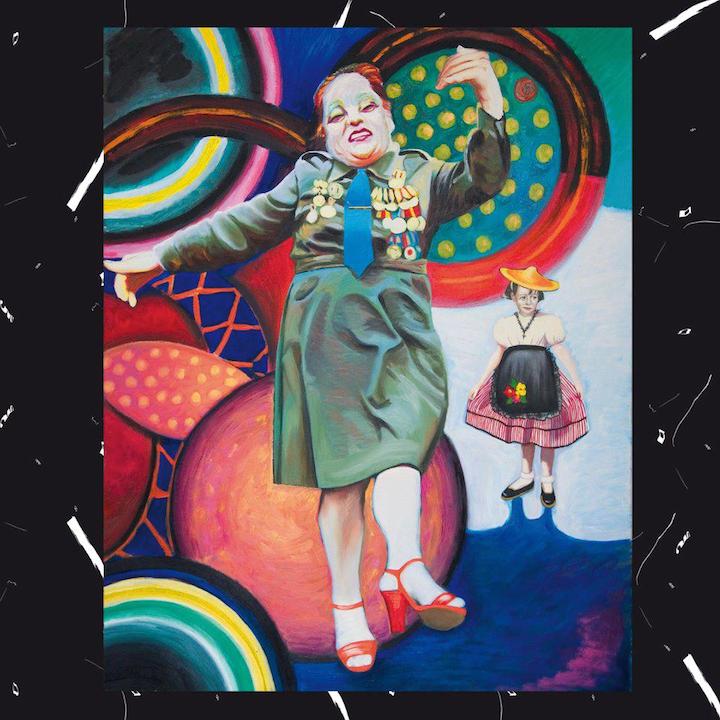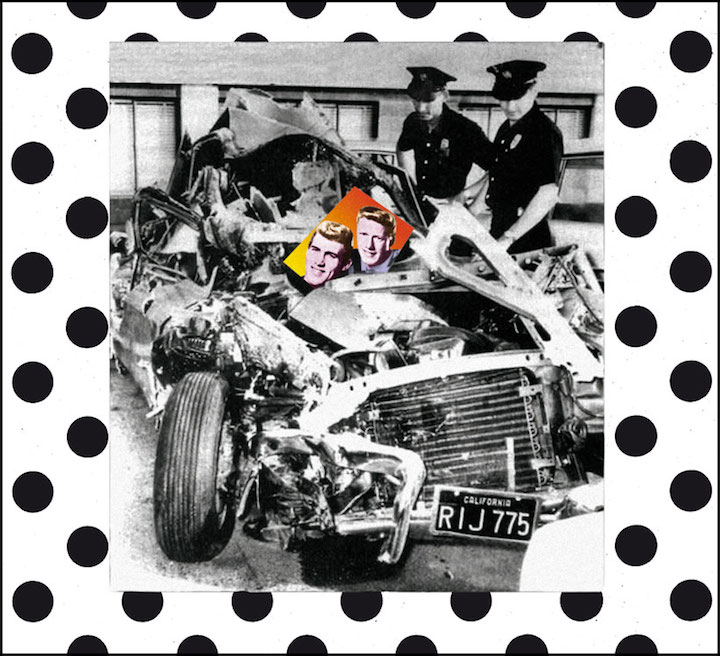
Tristesse Contemporaine’s Tristesse Contemporaine and Dirty Sound System’s The Music From the Balconies Nearby Was Overlaid by the Noise of Sporadic Acts of Violence
The Parisian DJ-collective-cum-record label Dirty Sound System—DJs Guillaume Sorge and Clovis Goux, alongside a roster of associated producers and curators—have always been somewhat out of sync with their contemporaries, and this characteristic has usually served them well. In 2003, at the fag end of the ‘French touch’ scene—the filter-heavy, dynamically compressed style of house music epitomised by Daft Punk and Cassius—they released their first compilation, Dirty Diamonds, on Stardust vocalist Benjamin Diamond’s label Diamond Traxx. In a French music scene that was floundering for a new direction, their recondite track selections were completely unexpected: the disco samples and slick synthesisers of the ‘French touch’ were eschewed in favour of grittier, more textured material. The compilation has a unified aesthetic, but one expansive enough for New York proto-punk oddities Suicide to rub shoulders with faux-naïf pop star Claudine Longet. These startling juxtapositions not only create a frisson of musical pleasure, but also recast history and allow listeners to discover new connections between various figures, both niche and mainstream, of twentieth-century music.
The collective’s virtues can manifest as contrarianism, however, and an early but telling example comes from Dirty Diamonds: aware that fellow Parisians Justice’s remix of the British rock band Simian’s track ‘Never Be Alone’ was making some headway in the world outside of Paris, they chose to include another remix of the same track, created by two of the members of Simian. While Simian Mobile Disco’s remix is arguably the stronger of the two, a few years later it looked as if they’d backed the wrong horse: Justice’s remix spearheaded the ‘Blog house’ sound associated with their label, Ed Banger—all punishing treble and tubthumping bass, with stadium-sized ambitions and hair metal’s gift for histrionics—and soon clubs the world over were rattling to ‘Waters of Nazareth’ and other, more annoyingly insistent tunes by Justice’s epigones. From the vantage point of 2012, though, we can see that Dirty Sound System had a longer-term vision: now that ‘Blog house’ and its associated acts are more embarrassing than exciting, the collective’s disregard for fashionability seems less of a liability and more of an insurance policy.
For similar reasons, their label’s first artist album, Discodeine’s self-titled debut, received something of a lukewarm welcome in the broader dance music culture when it was released in February 2011. Its stately, portentous 4/4 stomp remains completely at odds with the manic tempos and tricky drum patterns of fashionable UK bass music, and its melodic subtlety was lost on part-time ravers in thrall to the instant gratification of Skrillex’s day-glo arrangements. Time may yet vindicate Discodeine, but it’s hard not to see the sombre tone of the collective’s two most recent releases, Tristesse Contemporaine’s self-titled début and the new compilation The Music From the Balconies Nearby Was Overlaid by the Noise of Sporadic Acts of Violence as a response to the disappointing reception of Discodeine. Tristesse Contemporaine’s album is less ambitious than Discodeine’s—at eight tracks over 36 minutes, it could qualify as a long EP rather than an album—and The Music From the Balconies Nearby sees Dirty Sound System returning to a less adventurous compilation format than their experiments with the form on its predecessor, I Remember the First Time I Heard Your Voice. Yet for all that both albums feel less exciting than some of the collective’s past work, they are also strong and subtle, revealing themselves only after several listens.
Tristesse Contemporaine’s album may be short, but it feels weighty and fully realised. The opener, ‘Empty Hearts’, begins with a thick, rubbery bassline full of analogue imperfections: the right channel buzzes, and the recording doesn’t hide the distortion created by an overdriven amplifier. It’s a grimy and claustrophobic opening, so it’s no surprise that vocalist Maik comes in with a Sprechstimme not unlike that of Tricky. (He was previously the singer for trip-hop also-rans Earthling.) But whereas trip-hop favoured low, slow tempos and a generally chilled-out ambience, Tristesse Contemporaine has a more anxious edge: thus their tracks, such as ‘I Didn’t Know’, use harsh synth leads, and one of the percussive elements in ‘Hierarchies’ sounds like a ping-pong ball being aimlessly, repeatedly bounced in a solo game. There are some cringeworthy moments—the lyrics on ‘Daytime Nighttime’, for example, evince the occasional wince with their “soon/moon/June” simplicity—but overall Tristesse Contemporaine provides a compellingly bleak vista.
The Music From the Balconies Nearby—a title taken from JG Ballard’s novel High Rise—is not so much claustrophobic and bleak as bittersweet and rueful. As might be expected from these purveyors of obscurantism, it opens with a neglected masterpiece: ‘Forge Your Own Chains’, from DR Hooker’s 1972 private-press album The Truth. This cri de cœur against the perils of drug use—which, despite its protestations to the contrary, sounds mighty psychedelic—sets the tone for the compilation: a louche collection of loners’ and losers’ tales, with a strong nostalgic edge. Some of the other highlights include Clinic’s ‘Radiostory’—a narrative about a hallucinatory love affair with a woman who tastes of “Rémy Martin and ancient Rome”—eighties synth-pop oddity ‘Sommartid’, from Swedish nobleman Magnus Uggla, and 1970s chanteuse Léonie’s paean of admiration to John Lennon. The compilation’s centrepiece, however, is surely Billy Swan’s cover of Elvis Presley’s ‘Don’t Be Cruel’. Following a lead from the Octopus Breaks series of bootlegs, the Dirty Sound System have transferred the song from the 33 RPM vinyl at 45 RPM, artificially increasing both tempo and pitch. The end result sounds like a phantasmic Dolly Parton or Tammy Wynette cover version of an Elvis classic—and perfectly encapsulates the blend of humour, pathos, mainstream appeal and underground cred that defines Dirty Sound System.
Neither of these releases is available through widespread distribution networks—The Music From the Balconies Nearby is available only through the Parisian boutique Colette, and Tristesse Contemporaine is best acquired through distributors Pschent. Despite this, both are worth the effort in tracking them down. What this collective lacks in widespread reach it makes up for in quality, and both Tristesse Contemporaine and The Music From the Balconies Nearby offer an excellent introduction to the work of Dirty Sound System.

